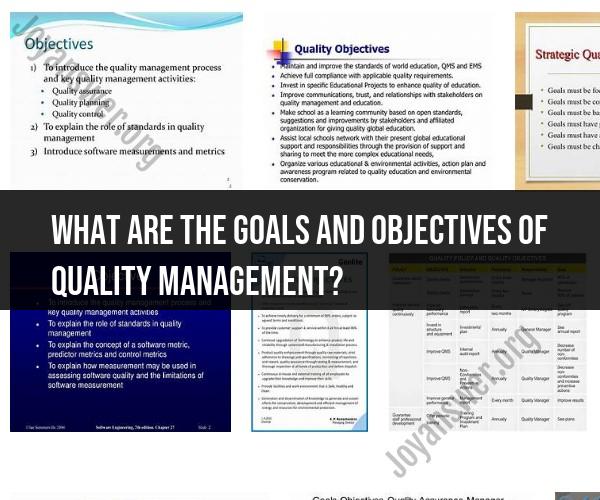What are the goals and objectives of quality management?
Quality management is a systematic approach to ensuring that an organization consistently delivers products, services, or processes that meet or exceed customer expectations. The goals and objectives of quality management are designed to drive continuous improvement, enhance customer satisfaction, and achieve operational excellence. Here is a comprehensive overview of the goals and objectives of quality management:
Goals of Quality Management:
Customer Satisfaction: The primary goal of quality management is to satisfy customers by meeting their needs and expectations. Happy and satisfied customers are more likely to remain loyal and recommend the organization to others.
Continuous Improvement: Quality management seeks to achieve continuous improvement in all aspects of the organization's operations. This includes processes, products, services, and employee performance.
Efficiency and Effectiveness: Quality management aims to optimize the efficiency and effectiveness of processes, reducing waste, errors, and unnecessary costs.
Compliance and Standards: Organizations strive to meet regulatory requirements and adhere to industry standards and best practices. Compliance ensures legal and ethical operations.
Risk Management: Quality management helps identify, assess, and mitigate risks that could impact the organization's ability to meet quality objectives.
Employee Engagement: Engaged and motivated employees are more likely to contribute to quality improvement efforts. Quality management fosters a culture of engagement and empowerment.
Innovation: Quality management encourages innovation and the development of new processes, products, and services that can lead to a competitive advantage.
Data-Driven Decision-Making: Quality management relies on data and metrics to make informed decisions and drive improvement efforts.
Objectives of Quality Management:
Establish Clear Quality Policies: Define clear quality policies, objectives, and targets aligned with the organization's mission and vision.
Implement Quality Standards: Implement recognized quality standards and frameworks such as ISO 9001 to ensure consistency and best practices in quality management.
Customer Focus: Place a strong emphasis on understanding customer needs and expectations and use this information to drive improvement.
Process Improvement: Identify, analyze, and improve key processes within the organization to enhance efficiency and effectiveness.
Quality Control: Implement quality control measures and inspections to detect and correct defects or deviations from quality standards.
Training and Development: Provide training and development opportunities to employees to enhance their skills and knowledge related to quality management.
Quality Audits: Conduct regular internal and external audits to assess compliance with quality standards and identify areas for improvement.
Measurement and Analysis: Collect and analyze data on key performance indicators (KPIs) to monitor progress toward quality objectives and make data-driven decisions.
Root Cause Analysis: Investigate the root causes of quality issues and implement corrective and preventive actions to prevent their recurrence.
Supplier Quality: Collaborate with suppliers to ensure the quality of materials and components used in the organization's products or services.
Customer Feedback: Solicit and analyze customer feedback to identify areas for improvement and enhance customer satisfaction.
Documentation: Maintain comprehensive documentation of quality processes, procedures, and outcomes to ensure consistency and accountability.
Leadership Commitment: Ensure that top leadership is committed to quality and leads by example in promoting a culture of quality throughout the organization.
Benchmarking: Continuously benchmark the organization's performance against industry leaders and competitors to identify areas where improvement is needed.
By setting and achieving these goals and objectives, organizations can establish a strong foundation for quality management, resulting in improved customer satisfaction, operational efficiency, and overall competitiveness. Quality management is an ongoing process that requires commitment and dedication at all levels of the organization.












